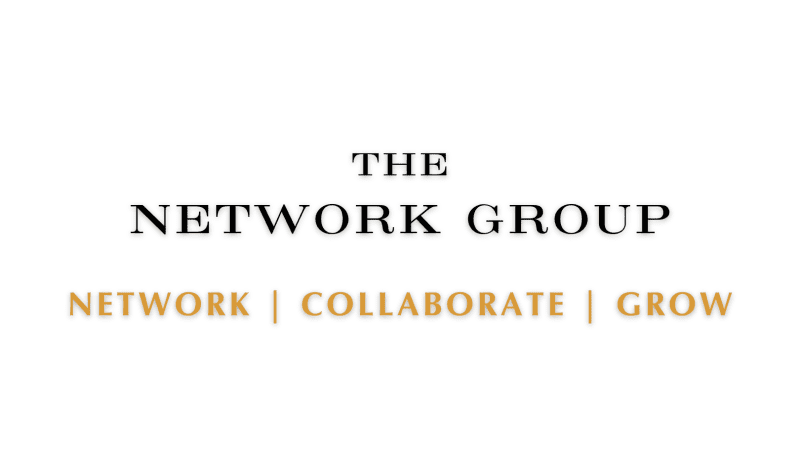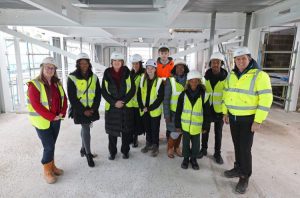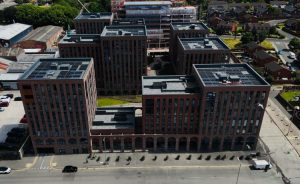The Greater Manchester Chamber of Commerce is currently celebrating its 230th birthday. To help commemorate the milestone, Business Connect caught up with Chief Executive Clive Memmott, OBE, to find out more about his role, his views on the economy, and the wider work the Chamber does:
Clive, please tell us about your position with the Greater Manchester Chamber, and the growth of the organisation from when you became Chief Executive?
“I’ve been Chief Executive now for 14 years. It’s an interesting role, somewhat different as Chief Executive of other businesses and organisations. The main task of a Chief Exec traditionally is to run an organisation and all the services it provides, however, for the Chamber you’re also there as a spokesperson, and representative of businesses. These are two interrelated but distinct roles as well, involving two skillsets, both of which I enjoy enormously.
“The Chamber isn’t just a private sector supplier of business services, we represent something greater than that. We are a prominent, influential voice of businesses in the city region, and we need to ensure issues get addressed. We need to make sure if you’re a business in Oldham, Rochdale or Stockport, you get as much representation as you do here in the middle of Manchester. We’re then of course representing Greater Manchester down in Westminster as well.
“Things have changed dramatically over the years. Looking back at the early days of devolution and the beginnings of the Northern Powerhouse – the whole excitement at the time that we had to do something different. Manchester was the starting point, and sat at the centre of that with the impressive economic growth it was generating. Manchester could prove it could use the public money invested in it consistently well, use it to make a good economic and social return, and gradually that whole bandwagon began to roll. That’s when the voice of Greater Manchester needed to make itself heard and was very successful in that respect.
“As well as working alongside other organisations like the British Chambers of Commerce, we were ensuring that the voice of GM’s businesses was heard directly by key politicians in Westminster. It was a fascinating time to start a fascinating job.”
How is the Chamber planning to attract new members, and which sectors are you targeting?
“It’s important to promote the city region as a place for business. There are two dimensions here. There’s international investment into the region, but you also have the region itself as a great place to do business. What is the reason you would come to Manchester? What makes it distinctive and helpful? It helps that growth has been spectacular and consistent over the years, and that in itself attracts people. The more successful an area becomes economically, the more it is seen as a thriving business environment which in turn encourages relocation and investment.
“There is also a distinctiveness about the region. When you compare us to London, with an economy valued at £86 billion compared to £550 billion for London, we still offer a sizeable business environment, yet we are very accessible. We offer far easier opportunities for connecting to the right people. This applies both internationally and nationally. It’s one thing to have the right offices and the right incentives and support located here, but on the back of that we must ensure that connectivity with the city region and the rest of the country is top class.”
What has been the impact for small businesses with Covid and Brexit – what support has the Chamber made available?
“95% of businesses across Greater Manchester are SMEs, so the Chamber’s support reflects that. People tend to homogenise the sector, however, the difference between a micro business and reasonably-sized SME is substantial. Take tech companies – they can have just a few people working for them, but the global reach and profitability can be substantial.
“We have to treat them all differently. In terms of business support, whether it’s start-up, scale-up, growth or survival, we’ll find a service for you. There have been two recent, pivotal events – Brexit and Covid – which brought incredible difficulties and challenges for businesses. At the start of the pandemic we introduced a helpdesk which was dealing with the most complex range of enquiries from people looking for help to get through something that they’d never faced before.
“We did the same for Brexit creating a helpdesk relating to issues leaving the EU. It was overwhelmed with enquiries. We have some very highly skilled people, and it was tough sharing their skills across so many enquiries. We had to reskill some of our non-international team to help, but to be fair the main role was to be there for members, being able to listen, and to show they weren’t alone when they felt most vulnerable.
“Let’s be clear. After a number of years out of Europe you’ve got the Office for Budget Responsibility, the OBR, clearly stating that leaving Europe has substantially damaged the economy. Thousands of small businesses have simply given up trading with Europe because it’s too tough. So, we’ve really got to work out how to put things right – how we can give those businesses better support, and how to scale that support. We also need to ask what does our future relationship with Europe looks like? The new government has a more positive tone when looking at that relationship, however, I find it difficult to understand what they mean by saying they want to increase ties with Europe without wanting to rejoin the Single Market or Customs Union. That needs to be understood.”
Tell us about networking opportunities for Chamber members?
“Networking is such an overused phrase, but we see the Chamber’s role in bringing together members as very important. We host and curate events based on place, on sector, on areas like international trade. We also do events based on subjects, for example leadership.
“Round tables are also great opportunities for networking, and offer really interesting meetings between national and local politicians, national institutions like the Bank of England and the Competition and Markets Authority, corporates and tech giants like Facebook, Cisco, TikTok, Microsoft and Amazon. We try and bring people together who wouldn’t normally get the opportunity to meet and talk, encourage thinking in different ways, finding new viewpoints.”
What benefits do the Chamber offer their members?
“Back in June we hosted our 230th birthday party. At that event I charted all the changes the Chamber has been through from 1794 as the Manchester Commercial Society, and the point here is that a lot of the issues in those days are the same as we’re experiencing today. For example, trade barriers and international trade, and making sure the local business environment is there to help, not penalise local businesses.
“I finished speaking at the event highlighting that 230 years have shown the resilience of the Chamber in the business environment. It means that as an organisation you have to be relevant in a modern economy, and the relevance of the Chamber is seen in the support it gives to members. The main pillars of our membership would be networking which I’ve discussed already. Also, we can help you market your message. This is particularly effective when your message is different from the norm, where you have something to say that needs promoting across a wider network. Another is international trade. It’s been our message since we started. We can connect you anywhere round the world through our international network. We can find a contact for you anywhere in the world and it’s our job to make sure that contact works with you. Also, one of the areas that we work hard at is business support. If we can’t help you directly, we can find someone who can. We work with organisations like the Growth Hub. It’s our job to connect the right people together to offer the exact services that a particular member needs for their business.
“Possibly the biggest benefit we bring is that it’s our job to represent the members. Many small businesses think that government is simply not interested in them. It’s our job to make sure they are. As long as the issues raised are relevant, we can push hard to make a change. We want to see the best business environment possible created in this region, this is where we can make a difference.”
How does the Chamber work with the local community, in terms of Corporate Social Responsibility?
“Although we do deliver business services, our job is to help with the wider issues of sustainability and social responsibility. We are active in the civic life of the region. The educational life too, also the cultural life of our city region. We have long supported the Manchester Jazz Festival, the Manchester Literary Festival. We’ve also got a fantastic collection of art in Elliott house from Eccles-born Ghislaine Howard. It’s a huge honour to display the work of a nationally acclaimed artist in this building. Rather than have pictures of buildings on the walls of our building, we wanted visitors to see top quality art reflecting more about the spirit of Manchester than the expected look and feel of a corporate space.
“Whether it’s an animal sanctuary, or a hospice, we have a strong tradition of helping those businesses that define our communities. By supporting our local members, we feel by being at the heart of our city region we can do most good for everyone in it.”
What do you feel are the biggest challenges that businesses are facing in terms of the economy?
“It’s a tough time at the moment for many businesses. The change in government has bought in a new wave of optimism across the country. That’s not a political view though. We’ve seen a ridiculous amount of volatility over the past few years, and that was affecting the economic credibility of the country. Apart from the periodic economic ups and downs, we’ve always been seen as a stable country politically, which means we have been seen as a safe place to invest in. The recent turmoil though has had an impact on international investment during this time, but we can now see a better outlook economically. We had a very short, sharp recession at the end of last year, and we seem to be doing a little better now.
“Growth in Quarter 2 was 0.6%, and we should finish the year at about 1% on GDP. Inflation’s down to 2.2% at the moment, however, we do still have a few issues around Services Inflation which is still high at 5.3%, but broadly speaking things aren’t too bad. There is still some Wage Inflation in the economy, and I don’t see that falling away in the near future. Also, there’s still a lot of geo-political uncertainty, and that could push inflation up again.
“So, although you look at our GDP figures in the last quarter and they seem to be the best of the G7 countries, we need to look deeper at what’s happening now. Any growth we’ve had recently can be seen less as a result of productivity improvement, but more a result of population growth. GDP per head has been poor for a long time. We’ve got some improvement, but it’s still not ideal. We’ve all heard what’s happening in public finances – there’s too much debt. We’ve heard about the £22 billion black hole, and we’re going to have a really tough budget. They’re not putting up income tax, or VAT, or corporation tax, but they are going to put up some taxes. We’ve seen the government pulling back from some large infrastructure projects too, but the only way to make the country’s economy grow is to actually invest in growth.
“The only way is to invest in our transport system, our education system, and our health service. We’ve had years of under-investment, and that has undermined our economic strength. I think it will be a fairly tough five years ahead, but for growth across our region over the next 3 years we’re looking at a higher rate than the national average. This has been the case over the last few years, and the challenge we will face is that population growth will follow, particularly in Manchester itself, and we need to ensure transport growth can support the upturn. I am a firm believer we can do this. We are the most devolved region in the country, and as such we can push for the infrastructure growth that we need to accommodate our growing workforce.”
Talking about infrastructure, what are your views on the cancellation of HS2?
“It was absolutely disgraceful. How can you talk about levelling up and yet the HS2 project was gutted? If you travel on the Elizabethan line in London it’s a magnificent piece of engineering. I am so proud of our capital city, I love going to it, and I love travelling around it. So when I return home, the infrastructure we have here is in stark comparison, simply unacceptable, and the problem is that this becomes, over time, acceptable. However the transport system in Greater Manchester is one of the best compared to other northern regions but that is certainly no reason to celebrate.
“I’m really pleased to see the proposals for a high speed link between Manchester and Liverpool that Andy Burnham and Steve Rotherham are putting forward.
“Economic growth is all about increasing the size of your labour market, something that goes back to the Northern Powerhouse days. If you link Liverpool, Manchester, Leeds and Sheffield, you get that huge labour market. Add increased connectivity with high speed broadband, you will create a significantly bigger and more effective economic zone, and that work still has to be done and mustn’t be neglected.”
What is the Chamber’s stance on the clean Air Zone due to be introduced by the Local Authority in Greater Manchester?
“Greater Manchester submitted proposals to government for an investment-led plan as an alternative to introducing a clean air charging zone which was not seen as the best way to deal with the problem.
“It would still not achieve compliance with the legal limits for nitrogen dioxide levels by 2026. In a nutshell, compliance can be better achieved through cleaner bus and taxi measures, alongside some localised traffic measures in parts of central Manchester and Salford. If the new government approves the plan submitted by all ten local authorities, the clean air plan would use government funding already awarded to buy new electric buses and fund grants for eligible taxis. This makes good sense as it deals with the critical air quality and health related problems in a much less disruptive way than the introduction of a charging zone. Therefore we must hope that there will be a favourable response from the government. The process has obviously been delayed by the recent change of government.”
For more information:
[email protected]
Visit: gmchamber.co.uk
The post Celebrating 230 years of business support and guidance appeared first on Business Connect Magazine.




